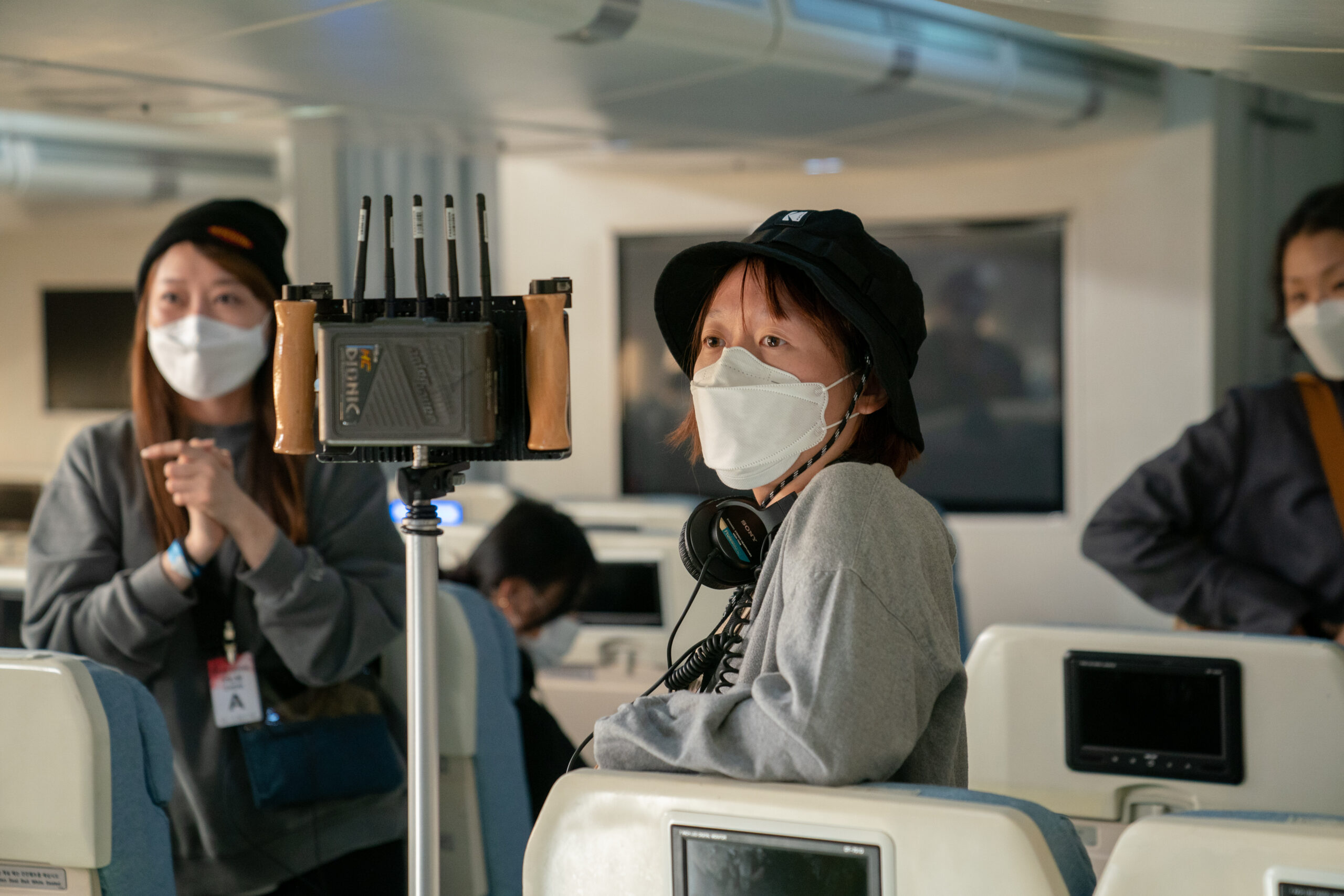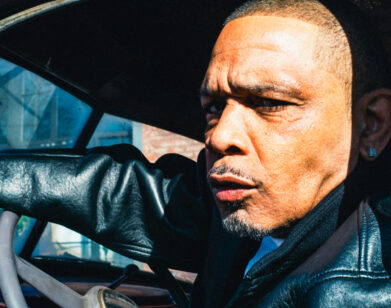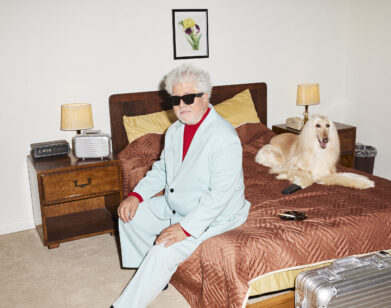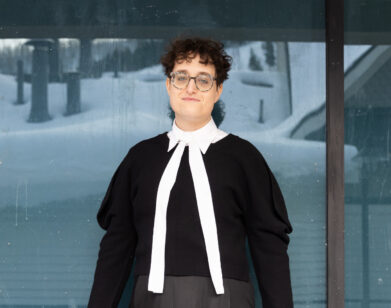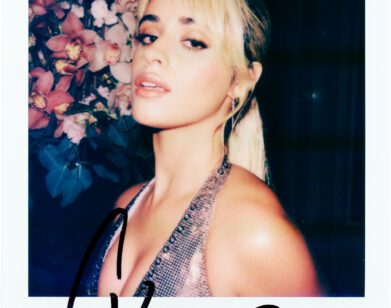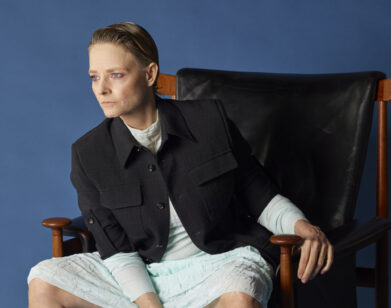DIRECTOR
Celine Song Tells Sharon Van Etten About the Power of Stupidity
“Who knows what you and I were to each other in our past lives, right?” Celine Song said to Sharon van Etten on Zoom last week. “Sometimes, how good our relationship is in this life is a way to pay off the debt of the earlier life.” It’s an idea that springs from Song’s 2023 directorial debut, Past Lives, for which Van Etten, along with Zach Dawes, made the powerful ballad “Quiet Eyes.” Past Lives, which was nominated for five Golden Globes earlier this month, begins in Seoul with the childhood connection between Nora and Hae Sung (played by Greta Lee and Teo Too, respectively) and follows them as they their lives peel in different directions, Nora to Canada and then New York, where she marries an American, and Hae Sung to the military and then China. After two dozen years apart, the two reconnect for a weekend of smoldering eye contact and questions of what could have been, though Song subverts the tropes of star-crossed romance to tell a more nuanced story of identity and immigration. “I’ll cry every time I talk I talk about it,” Van Etten told the director. “It’s that part of your heart you almost can’t touch that you conveyed so well.” As awards season heats up (“Quiet Eyes” is shortlisted for Best Original Song), the pair got together to discuss the utility of being stupid, their astrological signs, and the Leonard Cohen reference that began their creative partnership.—ELOISE KING-CLEMENTS
———
CELINE SONG: I’m happy to go on video, I just want to make sure that I don’t look disrespectfully horrible. Hi, my love. So happy to be talking to you.
SHARON VAN ETTEN: I’m so happy to be talking to you, and now seeing you. It feels like a lifetime ago now that we sat at the table together.
SONG: I know. When was the last time that we actually saw each other? You’ve been busy.
VAN ETTEN: I actually landed last night, and tomorrow I have to fly back to L.A. It’s 24 hours in New York, and I just love New York so much. How long have you lived in New York now?
SONG: Since 2011.
VAN ETTEN: That’s a life chapter.
SONG: When did you live in New York?
VAN ETTEN: I lived there from about 2004 to 2019.
SONG: That’s a whole past life right there.
VAN ETTEN: Yeah, formative years. The last year has been wild for you between sharing your film and now receiving it in a public space. How has that been feeling for you?
SONG: My feelings towards the movie itself and my love for it have not changed because when you first watched it, that’s the movie that it is now. I don’t have kids, but you do. Tell me if this is what it is. It’s an unconditional feeling you have because it’s a thing that you made. You just hope that when it finally starts walking and living in the world, that the world’s going to care for it. And in this last year, I feel that the world is caring for it, and I’m just so happy. But it’s not like, “Wow, now the people love it. I love it more.” How can you love the kid more just because it is loved by other people?
VAN ETTEN: Your heart is probably just growing with the work that you put into it. Even though it’s the same film, I feel like people are finding their meaning in it.
SONG: It’s true that as it connects to more hearts, it’s like it gets bigger. When you first wrote the song “Quiet Eyes” and sent it to me, I was like, “Sharon just gets me. She gets this movie.” I was like, “This is going to go in the movie. That’s it.” I had no feedback. I felt like the movie was so seen and understood. What’s that process like for you?
VAN ETTEN: It means a lot to hear you say that. I remember you writing me back right away being like, “It’s great.” Oh, I have a dog, by the way, that’s going to bark. Lindy, come here. No, no, no. You cannot bark right now.
SONG: Sir, you cannot bark right now.
VAN ETTEN: First and foremost, I was so moved by the film, and I connected with it deeply. In the initial emails about what it was you were looking for, you had a Leonard Cohen reference, and that was a little intimidating. I called my friend Zach Dawes, who I told you about, who creates scapes for me. By collaborating and talking about the sounds that I want and music references, he creates a palette for me to sing over in a world that I imagine you were painting for me. And I watched the film twice before I finished the lyrics. I was trying not to be too direct with the imagery of the film, but talking more about certain feelings in certain scenes. It feels chronological in the song, but not too literal. Some of the direction was nostalgic, poetic, what could have been, what got away. And with all those visuals and abstract notes and thoughts from watching the film, I wrote a melody trying to conjure my best Leonard Cohen.
SONG: The Leonard Cohen song that I sent you was “True Love Leaves No Traces.” And honestly, I think of it less as a Leonard Cohen song and more as a Phil Spector song.
VAN ETTEN: Oh, yes.
SONG: Phil Spector is at its loudest well of sound, and then you hear Leonard try to sing over it. His voice is so honey-like and sweet that it feels impossible for that voice to cut through whatever the hell it was that Phil was trying to do. It’s really more about the lyrics of the song, because true love leaves no traces, right? That’s a song that was playing on repeat when I was writing the script.
VAN ETTEN: Wow.
SONG: I mean, I remember talking to you after you saw the film. And I don’t mean to embarrass you, but you were crying while you were talking to me.
VAN ETTEN: I was, and I’ll cry every time I talk I talk about it. It was more about being moved than feeling sad. It’s that part of your heart you almost can’t touch that you conveyed so well.
SONG: You were laughing while you were crying the whole time. We were both laughing. They were kind of joyous tears.
VAN ETTEN: I mean, I allow myself to be moved and stay there. I don’t fight those feelings. And I think if you’re a creative person, you understand that.
SONG: I am so sensitive as well, so I love when you and I get to be so open about it. Music is so open about it, but there is a kind of restraint to being a writer and a director, because I can’t make everybody else deal with my emotions.
VAN ETTEN: I’m sure you can’t wear your heart on your sleeve because a lot of it needs to be interpreted by others and not seen through you necessarily. It’s the opposite for me. I need to share my feelings or people won’t understand me. But I find that interesting, and it’s probably a skill that I should access in my life more.
SONG: I don’t think you need to access that. It’s a special thing to be able to cry with your colleagues. That’s what’s happening with the characters in the movie as well. Nora is really looking for somebody that she can cry with, right? For a long time, it was Hae Sung, and then by the end of the film, she allows herself to do that with her husband.
VAN ETTEN: I don’t know how full you are with all the interviews you’ve had about Past Lives. But I’m curious, are you thinking ahead about what’s next? Because you worked on the film, then you shoot it, edit it, screen it, and that process takes so long. And now you’re sharing your thoughts and feelings and answering questions about it, but I’m sure you’re also anxious to move on from it.
SONG: Yes, without question. Even talking to you, I’m thinking about what’s next. Not actively, but it’s just always at the back of my mind. I believe that a movie is a song when it’s all said and done. It has to move like a song. We talk about rhythm, we talk about tone. It just takes a really long time to make this song. So I’m always so jealous that musicians making a song feels more finite. Of course, you have to perform it for the rest of your career.
VAN ETTEN: Yeah, if you’re so lucky.
SONG: If people love it. I love that, too. It’s a creative thing every time you perform it. Every performance you do, it’s alive again for an audience, and you can try new things or you can do it exactly the way you did it. A movie, when it’s done, it’s dead. It’s now a thing that you can put on in the airplane. It’s become an object. As soon as you’re done with an album or song, do you think about the next one?
VAN ETTEN: I mean, I’m always just writing, and I’m sure you’re the same. The actual creative part is always happening. I never know what I’m writing about when I start writing. I just let myself write until it starts revealing itself and then I carve out what those songs are and what the material is and it kind of morphs into a record eventually. But I have hundreds of unfinished songs that, if I’m feeling uninspired, I’ll just tap it into and try to relight that spark. It’s very Piscean.
SONG: I feel such longing for your process because it feels so organic and really beautiful. I wish I could feel it all day like that. I feel like I’m so goal-oriented in comparison.
VAN ETTEN: That’s how you get shit done. But I never really took a creative writing course. My brain doesn’t work that way. I really admire people that are able to lay out a narrative and then start diving into the internal. I’d love to be a fly on the wall of your writing sessions, or—
SONG: Well…
VAN ETTEN: Are you a loner in your writing?
SONG: I like having somebody in the room, but not to talk to them. It is totally a lonely thing. My process can feel a little bit overwhelming when it doesn’t have the right chemistry. I’m a Virgo, so I think about my work so organizationally. Sometimes I have a scene and I have a shelf that I know exactly where it goes. I’m like, “This scene has to go five scenes away from this one,” but I need somebody to be like, “Let’s not worry about organizing for a second.” You’re really compatible with your bandmates.
VAN ETTEN: I won’t go off on a tangent on this, but there’s this one guy on YouTube, Harvey Sid Fisher, and he’s like a Leonard Cohen character dressed in a ‘70s suit. He has an interpretive dancer behind him as he writes these songs about the horoscope. Aquarius is really funny, because they go Aquarius, hilarious, gregarious. They have a whole song for everyone, and it’s so spot on, it’s creepy.
SONG: I have to check this out. I’ve been into horoscopes since I was really young. Do you know Linda Goodman’s Sun Signs?
VAN ETTEN: No.
SONG: She’s from the ‘70s. I call that book a bible for horoscopes. It’s really how I learned English. That was a big part of my English education as an ESL kid.
VAN ETTEN: Oh, wow.
SONG: She’s a hippie, so she writes in a way where it intentionally, for poetic effect, is not so focused on accuracy and grammar. It’s all grammatically correct, but it will sort of feel like it’s a piece of music. I feel like it taught me how to be a writer, because it’s like, “Just because there are rules doesn’t mean that you have to follow every single one.” As a writer, you really shouldn’t.
VAN ETTEN: You said something that struck a chord just now, when you said that you’re an ESL kid. There was that scene in Past Lives where the girls were standing alone at the wall during recess while everybody else was playing. And when I watched that with my husband, we both got choked up. This was very close to your life, right?
SONG: Mm-hmm.
VAN ETTEN: Moving at that age to another country with English as a second language, what was the transition like? Were you scared or were you more excited?
SONG: It was probably very scary for my parents because they’re adults, but when you’re a kid, maybe there is fear, but it’s kind of overwhelmed by your own childhood stupidity. I think about the power of stupidity so much. It’s the most important part of creative work. It is so powerful to be able to say, “No, I’m actually too stupid to know how to do that or to know what to be afraid of.” Because without it, it’s really hard to take a leap of faith.
VAN ETTEN: Right.
SONG: It’s frustrating when there are things you want to communicate but you can’t, but that frustration is also a great energy for you to learn. Part of being a filmmaker for the first time was that we shot this movie in COVID and everybody was saying how hard it was going to be, and I’m like, “Well, I don’t know what it’s like to shoot before COVID.” Or they’ll be like, “You’re going to shoot on film, it’s so hard.” And I’m like, “I don’t know what it’s like to shoot on digital.” It’s that power of not knowing. It makes you so bold because you don’t know better.
VAN ETTEN: It’s just what’s happening.
SONG: If I knew then everything I know now about making a movie, or if I knew then what it actually means to immigrate, I think that kid or that director would be so much more afraid. It would be harder for them to adjust. But because they didn’t know better, they could get through it kind of unscathed. Of course, there are moments throughout both immigration and making this movie where you were like, “Oh, crap. That was scary.” You get smarter as you go. But it’s important to always go back to that feeling of having nothing but faith.
VAN ETTEN: Mm-hmm.
SONG: There’s this word in Korean called cheoshi, which means first heart. Cheo is first, and then shi means heart. It’s a very big part of talking about creative work in Korea, where they say you have to go back to cheoshi, the first heart with which you made something when you’re at a loss. I think about that word a lot. When I’m making my next movie, I want to still feel as stupid as I did when I first immigrated or when I first started making Past Lives.
VAN ETTEN: That’s beautiful. I was trying to write the word down, and I’m glad you can’t see how I wrote it, but it’s a beautiful idea, as well as inyeon. That was such a meaningful center of your film, the connection between people and the past.
SONG: I love that word because there’s no judgment. Because of working on this movie together, you and I have a really positive inyeon, and I want this inyeon to continue in our lives. Who knows what you and I were to each other in our past lives, right? Sometimes how good our relationship is in this life is a way to pay off the debt of the earlier life. It all leads to a kind of forgiveness. What was that bar we went to? We went to that really nice bar.
VAN ETTEN: The wine bar?
SONG: Yeah, I remember just sitting there with you and Zach thinking, “What a special thing that you made an original song for my movie.” So many people talk to me about your song. It even showed up in a lot of people’s Spotify Wrapped. People listen to it on repeat. And every time you hear the song, you’re going to think about the movie. It’s never going to be not a part of it. What a deep inyeon that is.
VAN ETTEN: My mind is still blown that you asked me to be a part of it and I’m still in awe of what you made and the group of people that you brought in to make it. I’m excited for what is next for you. I love you so much.

